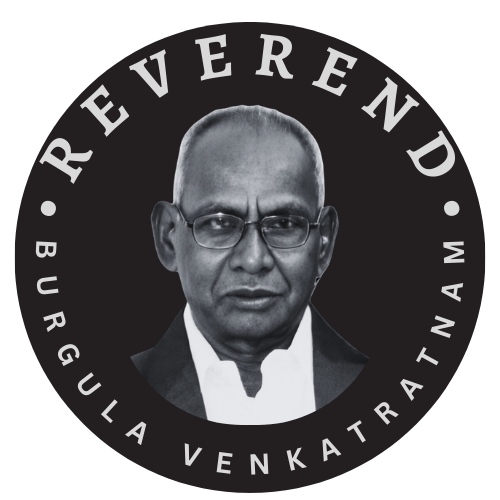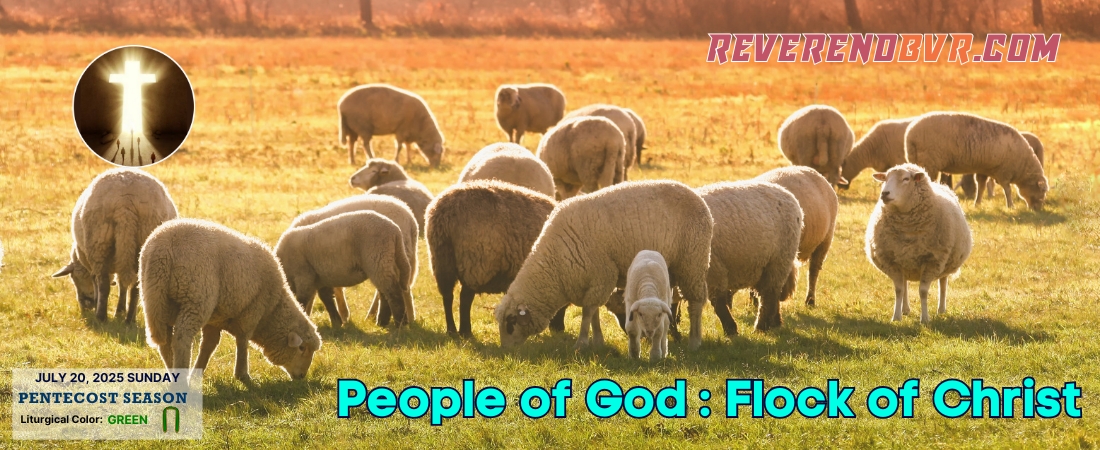In a fragmented world, the people of God are called, formed, and led as Christ’s flock—intimately known by the Good Shepherd whose voice they discern and follow. This sermon reveals how covenant identity, spiritual purification, and communal witness shape the Church as a Eucharistically nourished, mission-driven community rooted in grace and responsive worship.
Sermon Topic: People of God: Flock of Christ| People of God: Called, Formed, and Led as Christ’s Flock
Meditating Verse: “I am the good shepherd; I know my sheep and my sheep know me.” (John 10:14)
Date: June 20, 2025, Sunday.
Scripture Readings: Genesis 35:1-15 | Psalm 95 | Acts 16:11-15 | John 10:1-6;
Original Language Reflections (For deeper study, see Section 8 in the sermon): Refer Table explaining Hebrew & Greek Words.
Website: www.reverendbvr.com
1. Introduction: A Shepherd’s Call to a Fragmented World
In an age where identity is fractured and community increasingly contingent, Scripture reorients us to an enduring metaphor: that of the flock. Not passive or directionless, but relationally bound and purposefully led. John 10:3 declares, “He calls his own sheep by name and leads them out.” This image is neither quaint nor antiquated—it is profoundly countercultural. It confronts individualism with covenant, self-assertion with divine calling, and spiritual confusion with the clarity of the Shepherd’s voice.
The notion of sheep, far from connoting ignorance, signals spiritual sensitivity and recognition. The sheep of Scripture are those who discern the true voice amidst many, who follow not by compulsion but by conviction born of love.
The four readings this Sunday—Genesis 35, Psalm 95, Acts 16, and John 10—unveil a canonical unity: the people of God are the flock of Christ. They are called by name, purified by grace, sustained by covenant, and sent forth in mission.
2. Genesis 35: Covenant Renewal and Ecclesial Identity
Jacob’s journey to Bethel is a theological turning point. The divine imperative—“Go up to Bethel and settle there” (v.1)—is not mere geographical relocation; it signifies spiritual reconstitution. Jacob’s household must first undergo cleansing: “Get rid of the foreign gods… purify yourselves… change your clothes” (v.2). This tripartite action—renunciation, purification, and re-clothing—parallels the sacrament of baptism, which enacts death to idolatry, purification of the heart, and clothing in new identity (cf. Romans 6:3–4; Galatians 3:27).
Significantly, the burial of idols beneath the oak at Shechem (v.4) anticipates the cross—the place where rival loyalties are decisively renounced. Jacob’s renaming as “Israel” (v.10) confirms that divine election is not merit-based but grace-driven. The community of the flock is not ethnocentric; it is covenantal.
Theological Thesis: The flock of Christ is not an assemblage of the morally elite but a people formed by divine initiative and purified through obedient response.
3. Psalm 95: The Joy and Peril of Worship
Psalm 95 juxtaposes doxological delight and prophetic warning. It begins with exuberance: “Let us sing… let us shout aloud… let us come before him with thanksgiving” (vv.1–2). But the mood turns midstream: “Today, if only you would hear his voice, do not harden your hearts…” (vv.7–8).
The psalmist names Meribah and Massah—moments when the people, despite proximity to divine provision, fell into spiritual forgetfulness (Exodus 17). This dynamic of celebration and caution calls the church to maturity: true worship entails not just liturgical rhythm, but spiritual responsiveness.
Pastoral Implication: Liturgical participation without relational attentiveness to God risks cultivating nominalism. To belong to the flock is not merely to be present, but to be receptive.
4. Acts 16:11–15: Lydia and the Expansion of the Flock
Lydia’s encounter with Paul at the riverside in Philippi is emblematic of God’s sovereign grace at work across cultural lines. Though a “worshiper of God,” her heart remains unopened until “the Lord opened her heart to respond” (v.14). Here we witness divine action—κύριος διήνοιξεν τὴν καρδίαν (ho kyrios diēnoixen tēn kardia)—preceding human response.
Lydia’s immediate hospitality and her household’s baptism mark a corporate reorientation. Like Jacob’s altar at Bethel, her home becomes a center of ecclesial life.
Corrective Theological Insight: Conversion is never a private transaction. Authentic reception of the Shepherd’s call inaugurates communal witness, economic generosity, and sacramental participation.
5. John 10: The Shepherd’s Voice and the Flock’s Vocation
In John 10, Jesus does not merely compare himself to a shepherd—He claims the definitive identity: “I am the good shepherd” (ὁ ποιμὴν ὁ καλὸς ho poimēn ho kalos, v.11). The contrast with the hired hand underscores the ethical essence of true leadership: sacrificial, not self-serving; relational, not exploitative.
Christ’s voice—φωνή (phōnē)—is known to the sheep. This knowledge, rooted in intimacy, entails theological literacy and ecclesial discernment. It is neither subjective mysticism nor abstract cognition, but personal communion.
St. Augustine insightfully remarks: “He called you through grace, not because you were sheep, but so that you might become sheep” (Sermon 87 on John 10). Our identity is not anterior to grace—it is grace’s effect.
Sacramental Note: In the Eucharist, the Shepherd feeds His flock. The table is not an addendum to worship—it is its telos. The flock is not a metaphorical construct but a Eucharistically nourished community.
6. Implications for the Contemporary Church
| Spiritual Truth | Pastoral Application |
| Identity: The church is a covenantal flock, not a voluntary association. | Embrace belonging as vocation, not preference. |
| Purity: Idols must be buried before Bethel can be built. | Identify modern idols: successism, nationalism, autonomy. |
| Discernment: The Shepherd’s voice is recognizable. | Form disciples through Scripture, prayer, and community. |
| Mission: The flock grows by grace, not by programs. | Practice radical hospitality, as Lydia did. |
7. Conclusion: Hearing Amidst the Noise
In a world of competing voices, the Church must be the community that listens. Like Jacob, we must return. Like the psalmist warns, we must not harden our hearts. Like Lydia, we must open our homes. And like the sheep, we must follow—not abstract principles, but a crucified and risen Shepherd.
“I am the good shepherd; I know my sheep and my sheep know me… and I lay down my life for the sheep.” (John 10:14–15)
Let us not merely admire the Shepherd—>let us follow Him.
8. Closing Prayer
Good Shepherd, Amid the noise of this world, tune our hearts to Your voice. Call us by name, as You did Jacob and Lydia. Cleanse us from the idols that fragment our witness. Lead us into covenantal life, sacramentally nourished and missionally sent. May we be not a scattered people, but a gathered flock— A people who hear, follow, and proclaim You, Until Your voice resounds to the ends of the earth. In Your holy name we pray, Amen.
9. Original Language Table: Hebrew and Greek Terms
| S.No | Word | Language | Meaning | Scriptural Context |
|---|---|---|---|---|
| 1 | בֵּית־אֵל (Bethel) | Hebrew | House of God | Genesis 35 – Site of covenantal return |
| 2 | רָעָה (ra‘ah) | Hebrew | To shepherd, care for | Psalm 95:7 – “Flock under his care” |
| 3 | καρδία (kardia) | Greek | Heart | Acts 16:14 – Lydia’s opened heart |
| 4 | καλὸς (kalos) | Greek | good | John 10 – Jesus as the Good Shepherd |
| 5 | ποιμήν (poimēn) | Greek | Shepherd | John 10 – Jesus as the Good Shepherd |
| 6 | φωνή (phōnē) | Greek | Voice | John 10 – Recognition of the Shepherd’s call |
10. Bibliography
- Augustine of Hippo. Sermons on the Gospel of John. Nicene and Post-Nicene Fathers, Series I, Vol. 7.
- Chrysostom, John. Homilies on the Gospel of John. Nicene and Post-Nicene Fathers, Series I, Vol. 14.
- Bauckham, Richard. Bible and Mission: Christian Witness in a Postmodern World. Baker Academic, 2004.
- Brueggemann, Walter. Theology of the Old Testament. Fortress Press, 1997.
- Wright, N. T. John for Everyone, Part 1. SPCK, 2002.
- Fee, Gordon D. & Stuart, Douglas. How to Read the Bible for All Its Worth. Zondervan, 2014.
- Brown, Raymond E. The Gospel According to John I–XII. Yale University Press, 1966.
© 2025 ReverendBVR.com | High-Academic Sermon Series, 2025.
Content licensed under Creative Commons Attribution-NonCommercial-NoDerivatives 4.0 International (CC BY-NC-ND 4.0). You are free to share — copy and redistribute the material in any medium or format with proper attribution. No commercial use or modifications allowed without explicit permission.
For further sermons and biblical reflections, please visit 🌐 www.reverendbvr.com/sermons

